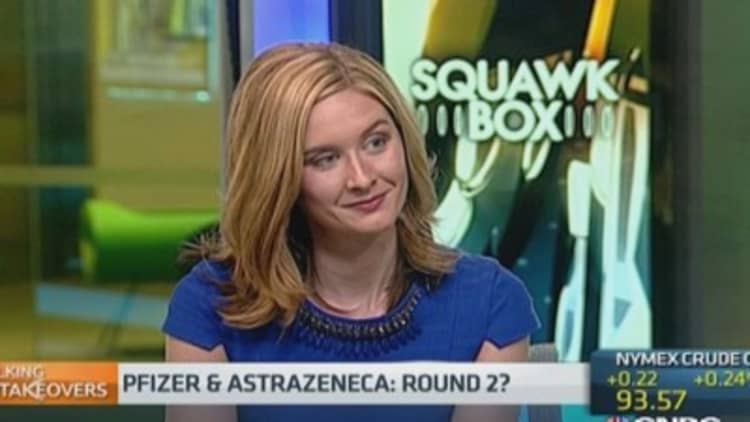
The potential for Pfizer to take over U.K. pharma giant AstraZeneca has already sent its prey's share price soaring and caused political ructions on both sides of the Atlantic – without an agreed deal on the table.
With the expiration of a three-month period during which Pfizer must stay away from AstraZeneca, under U.K. takeover law, on Tuesday, speculation that the maker of Viagra may eventually seal this deal has risen.
For Pfizer, the possibility for saving on its tax bill by headquartering in the U.K. for tax purposes, a process known as tax inversion, would be one of the biggest drivers behind such a deal, along with building up its cancer medicines portfolio.
There are a few ways this story may end. Pfizer and AstraZeneca spokespeople declined to comment.
AstraZeneca invites Pfizer to the table
Under U.K. takeover regulations, AZ management can now re-engage with Pfizer (but not the other way round). This is unlikely given the lack of a concerted shareholder rebellion (yet) against the AZ board, and the board's apparent determination to go it alone. There are a couple of key events for AZ to convince shareholders of this strategy: the main European cancer doctors' conference at the end of September, and an investor day scheduled for the week before Pfizer can make another public bid
Pfizer submits a new one-off private bid
Pfizer has one chance to approach AZ with a new bid in the next three months, but it must be done in private under U.K. takeover laws, and may mean the company paying above the odds for its smaller rival.
Pfizer makes a new public bid (after Nov.26)
The world's biggest pharma company must stay away from its prey until November 26th, six months after its last public offer expired. Pursuing a bid after this date would have the added advantage of further clarity from U.S. politicians over whether tax inversion-motivated deals might be subject to retrospective changes, to make them less attractive.
No deal
Pfizer may buy another company, such as Actavis, to gain tax advantages, or decide that the political risks of a tax inversion-based deal are too high.
- By CNBC's Catherine Boyle





